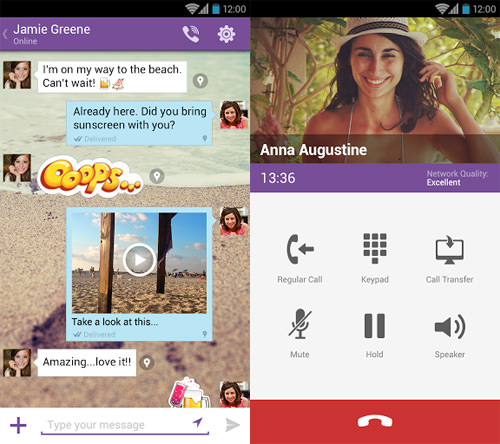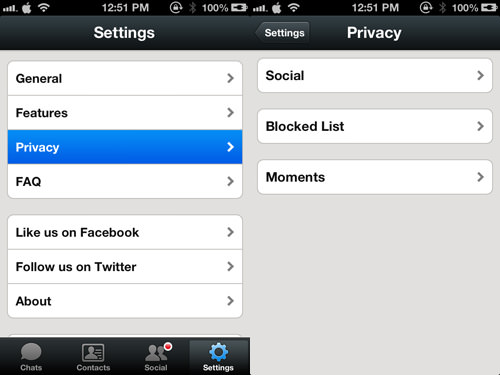Now that instant messaging has become an important part of many people’s lives, a vital question arises—what is the best messaging app? Is it WhatsApp, WeChat, Viber or something else, such as Facebook Messenger, or is there no difference between these popular solutions?
The tech media do not seem to provide any answers to these questions because they seem to be just as divided as everybody else. Therefore we’ll take a look at the arguments for all the apps and let you make up your mind.
To achieve this, we’ll present the case for and against each of these apps. The arguments for each of the solutions are strong but so are the arguments against them.
The Case for WhatsApp
Since WhatsApp is the best known and most popular instant messaging solution, the case for it is strong. The arguments on behalf of WhatsApp include:

- It is the world’s most used instant messaging solution, with 700 million users, according to Statista. That means most smartphone users are familiar with it. There is a strong possibility that the people in your address book are already using WhatsApp and can be quickly contacted with it.
- WhatsApp can do far more than messages. You can make phone calls, send videos and send pictures for free using it.
- WhatsApp is a fairly small app. It only takes up 21.5 megabytes of data. That means it takes up less of your data plan and may not increase your phone bill.
- WhatsApp can be used on laptops, tablets, and desktop computers by taking advantage of WhatsApp Web.
- WhatsApp is available for a wide variety of platforms, including Android, Windows Phone, iPhone, Blackberry, and Nokia S40 and S60 devices.
- WhatsApp is a totally ad-free solution.

The Case Against WhatsApp
There are some drawbacks to WhatsApp that many people are not aware of, including:
- The only Apple devices that WhatsApp can be used on are iPhones with iOS 4.3 and above. If you want to use it on an iPod or an iPad, you will have to use a jailbroken device on which restrictions have been removed. This means it might not operate correctly on such a device. You can use WhatsApp Web on Apple tablets.
- The amount of technical support available for WhatsApp is very limited, Hokiat reported. If it is not working, you could be left on your own or asking a tech savvy friend for help.
- WhatsApp is a paid app. You have to pay a onetime fee of 99¢ to set it up and 99¢ a year to use it.
- WhatsApp can use up a lot of digital bandwidth, so it can raise your phone bill by eating up your data plan.
- Since WhatsApp is an Internet-based solution, you will need a good cellphone signal or a Wi-Fi connection to use it.
- It does not always support voice calls.
The Case for Viber
Even though it is not as popular as WhatsApp, Viber is more flexible and more popular in some quarters.

- Viber is only one of the big three messaging apps that work on Samsung’s proprietary Bada operating system. That means little because most Samsung devices use Android instead; Samsung recently abandoned Bada and started developing a new system called Tizen.
- Like WhatsApp, Viber can be used on desktops using Viber Desktop.
- Viber is a completely free app, unlike WhatsApp.
- Like WhatsApp, Viber is a completely advertising-free solution.
- Viber has a very high customer user rating in the App store and Google Play, 4.4 and 4.5, versus.com reported, meaning that customers really like it.
- Viber supports a wide variety of languages.
- Viber lets you receive messages when you are offline.
- Viber has a built-in translator.
- Viber is one of the smallest messaging maps, meaning it takes up less bandwidth. It is only 19 megabytes in size, while WhatsApp is 21 megabytes in size.
- It does support voice calls, including calls to phones.
The Case Against Viber
Even though the geeks seem to like it, there are some reasons to avoid Viber, including:

- Viber is not as widely used as either WeChat or WhatsApp; it only has 236 million users worldwide, according to Statista. That means contacts are less likely to be in your address book.
- It has no built-in games.
- It cannot send music files.
- There is no message seen notification.
- Hogkiat reports that Viber does share some information with Google, which makes your phone easier to track.
The Case for WeChat
After WhatsApp, WeChat is probably the most popular standalone instant messaging app around. Some arguments for it include:

- It is very popular. Statisa estimated that WeChat had 500 million users compared to Viber’s 236 million users. That means your contacts are more likely to be using it.
- It is very versatile; it lets you switch off notifications.
- WeChat lets you see when somebody else is typing.
- WeChat lets you share music files with your friends.
- It can be personalized.
- WeChat has built-in games.
- Web Chat lets you use WeChat on desktop browsers.
- We Grab feature lets you send webpages from your browser to your phone.
- WeChat is available for iOS, Android, Windows Phone, Blackberry, and Nokia devices.
- WeChat is a completely free app.
- Since it is not connected to your phone number, WeChat can be used on tablets and similar devices.
- WeChat has quite a few social add-ons that are not available on WhatsApp and Viber.
- It will support direct voice calls.
- Observers note that you can have more fun on WeChat because of everything that people can do on it.
The Case Against WeChat
- WeChat is not connected to your phone number, so instant messages cannot be sent directly to your phone.

- WeChat is a fairly large app that takes up a lot of bandwidth, 34.5 megabytes compared to WhatsApp, which is only 21.9 megabytes. That means it can use your entire data plan and raise your phone bill. It also means it will not always work.
- It does not allow group chat like WhatsApp does.
- Since it is not connected to your phone, many contacts may not be in your address book.
Which Messaging App Is Best?
The bottom line is that all three apps can meet the average person’s needs. If you just want to send messages, WhatsApp is probably the best, but WeChat is a little better if you want to use your phone as a social media device.
